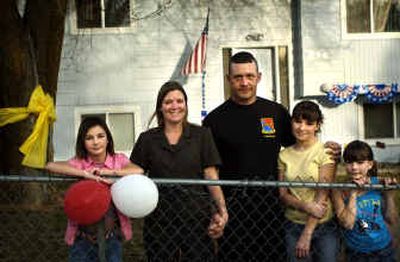Home sweet home: Valley soldier always reported for dad duty

His flak jacket and drab-green duffle bags lay in the entryway of his Spokane Valley house as if James Dokken walked out of the desert yesterday and hastily dumped the load.
There are patriotic balloons tied to the chain-link fence outside and tiny American flags along the walkway to the front door. Ask any one of the Dokken girls what’s going on. They’ll tell you, “Daddy’s home.”
“We went and got him from Fort Lewis yesterday,” said Desi, Dokken’s youngest daughter. Standing in the front yard of their Calvin Court home, the 11-year-old girl hucks a stick at the family dog, then says, “He was in Iraq.”
Dokken came home last Wednesday. He has all his limbs. All of his moving parts still move after a year-long tour with the Washington National Guard’s 81st Armor Brigade. A tank driver by training, Dokken found himself doing Humvee and foot patrol near Baghdad International Airport. The only casualty of his tour is time.
“I left, but they kept going,” Dokken said of this family. “The oldest one is quite a bit different.”
His oldest daughter, Kendra, turned 15 while Dokken was gone. His best fishing buddy, Kendra has traded her lures for cosmetics, her pole for a curling iron and blow-dryer. She has her own cell phone now. Kayla, 14, isn’t far behind her older sister. Desi looks like she’s been washing in Miracle-Gro.
These are the girls who remained unchanged in a photograph that Dokken wore around his neck while stationed at Victory Camp south of Baghdad. He would only take the photograph off when its plastic cover collaborated with the heat to encourage a rash on his chest. Otherwise, he wore it faithfully.
“My wife, my family kept me going,” Dokken said.
Dokken’s wife, Heidi, said it was amazing how well her husband managed to stay connected, despite being 11 time zones away. He’d call and talk for 15 minutes about once a week and e-mailed frequently. He tracked his daughters’ grades and did his best to keep up.
Likewise, Heidi Dokken and her daughters did their best to understand a land they’d never seen. When James Dokken mentioned that camel spiders were a real problem, the kids looked them up on the Internet and were shocked to find pictures of a hand-sized insect.
They would have inquired more often, but Dokken encouraged his wife to tune out the TV news. He tried not to mention when he went out on patrol. He stuck to what was important at home.
“He remembered all the kids’ birthdays, our anniversary,” Heidi Dokken said. “He even remembered my mom’s birthday.”
On Christmas, Dokken sent his children backpacks with their names embroidered on them. He sent the girls playing cards with Iraq’s most wanted on the back and an explanation of each person printed in the native language.
“You know how considerate he is?” asked Carol Carr, Dokken’s mother in-law. “He called from Iraq and made an appointment to get the oil changed in (Heidi’s) car.”
Halfway through Dokken’s tour, his family moved – from Endicott to Spokane Valley. The soldier came home on leave just long enough to do the heavy lifting. Those moving days were the only two days he had spent inside his new home before returning last Wednesday.
When the family reunited last week, Heidi loaded the kids into the car and drove through the night with her mother to be at Fort Lewis near Tacoma for an early morning homecoming. They gathered with about 500 other relatives and waited in a gym for their loved ones.
There the soldiers’ children were given plenty of paper and markers for “welcome home” signs. The adults didn’t mingle much, Heidi said. Most stared quietly at a projection screen, watching a video of the 81st Brigade’s time in Iraq.
All those minutes at war were condensed into a short presentation. For the families it was like discovering spilled sand from an hourglass. When the troops entered, everyone swept up what was theirs and headed home.